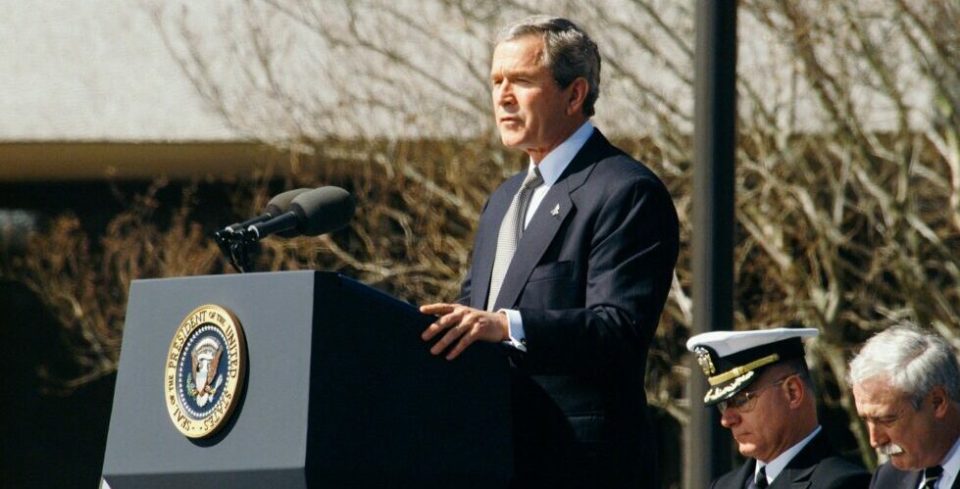So, I have had an very taxing weekend and was unable to put up a new article. Hopefully I’ll get that done tomorrow. However, I did notice this in my RSS feeds yesterday and thought it to be fascinating. I’m actually quite floored that Bush is effectively admitting to the press that the war was a bad idea. While I am still convinced their was intentional deception from the White House (not necessarily Bush himself, but possible) regarding the justification for invasion based on the evidence I’ve seen presented from Antiwar.com and elsewhere, this is most certainly a step in the right direction.
“War is the health of the state,” as Randolph Bourne said. The Iraq War and the War on Terror allowed the government to take so much of America’s resources and civil liberties and dissolve them into nothing. It’s high time that this be stopped.
Interview: Iraq war my biggest regret, Bush admits | World news | The Guardian
George Bush, in a moment of reflection ahead of his departure from the White House, last night admitted that the decision to go to war against Saddam Hussein on the basis of flawed intelligence was the biggest regret of his presidency. The acknowledgment marks the first time that Bush has publicly expressed doubts about his rationale for going to war on Iraq.
In the run-up to the war, the White House adopted a position of absolute certainty that Saddam had weapons of mass destruction, basing its arguments on intelligence that was later exposed as flimsy and wrong.
“The biggest regret of all the presidency has to have been the intelligence failure in Iraq,” Bush told ABC television in an interview scheduled for broadcast last night. “I wish the intelligence had been different, I guess.” But he followed that moment of candour with an attempt to try to deflect charges that the White House misled Congress and the public to build a case for war, arguing that there had been widespread belief that Saddam had a nuclear arsenal.
“It wasn’t just people in my administration; a lot of members in Congress, prior to my arrival in Washington DC, during the debate on Iraq, a lot of leaders of nations around the world, were all looking at the same intelligence.”
He was not asked about allegations that political pressure was brought to bear on the CIA and other intelligence agencies in the run-up to the war.
The exit interview found Bush in an unusually reflective mood for a president who has famously refused in the past to admit any mistakes. He did not go so far as to say he would not have gone to war if the intelligence had been correct.
“That’s an interesting question. That is a do-over that I can’t do,” Bush said, according to excerpts from the interview at Camp David. Later he said: “I will leave the presidency with my head held high.”
Despite the flawed basis for the invasion of Iraq, Bush defended his decision to leave US forces in the country.
Though Iraq remains among his defining legacies, he said he had not anticipated going to war when he was running for the White House. “I was unprepared for war. In other words, I didn’t campaign and say, ‘Please vote for me, I’ll be able to handle an attack’. I didn’t anticipate war.”



), //libertarianchristians.com/wp-content/plugins/smartquizbuilder/includes/images/template6-latest.jpeg))

), https://libertarianchristians.com/wp-content/plugins/smartquizbuilder/includes/images/template6-latest.jpeg))


;?>/smartquizbuilder/includes/images/sqb-registration-img.jpg)

